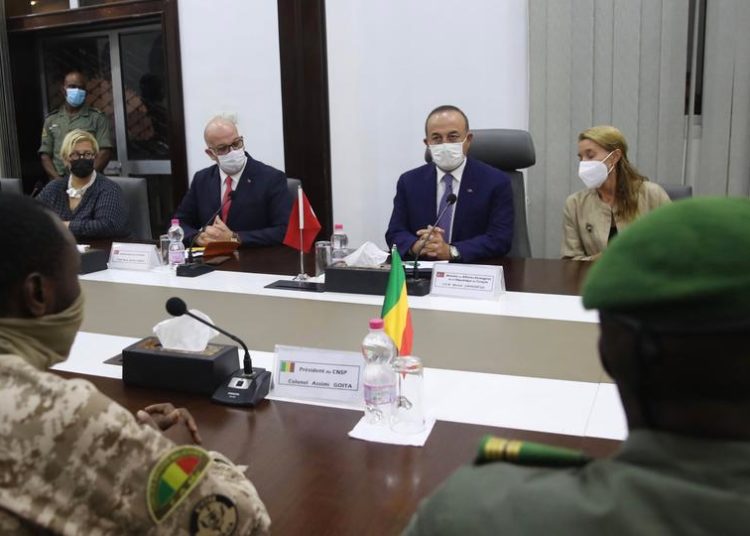Nordic Monitor
Turkish Foreign Minister Mevlüt Çavuşoğlu is the first high level, non-African official to visit Mali since the coup in August in order to shape the transition period in line with his government’s Islamist policies.
President Ibrahim Boubacar Keita was forced to resign and dissolve the parliament and government as a result of a coup by a military junta in Mali on August 18, 2020. International organizations including the UN, the EU, the African Union and ECOWAS have strongly condemned the military action and called for the immediate restoration of the constitution. Members of the UN Security Council have urged the Malian military to immediately release the country’s president and members of his government and return to their barracks without delay.
In parallel to the international community, Ankara revealed its support for the international efforts with a press release on August 19 and asked the Malian military junta to release President Keita and other high-ranking officials. Despite the foreign ministry statement condemning the coup, Çavuşoğlu met with members and the head of the National Committee for the Salvation of the People.
Çavuşoğlu’s visit to Bamako on September 9 revealed that Turkey is intending to expand its influence over the transition process and to guarantee a post-coup Islamist government in the Sahel country in accordance with Turkey’s Africa policy. The visit, which was seen by many as a step legitimizing the military coup, is a sign that Ankara considers the coup a new opportunity and is expecting a “power vacuum” in Mali. In its moves and contacts in Bamako, Ankara is benefitting from the anti-French tendencies in the country and Keita’s close links to Paris.

Some of Turkey’s ruling Justice and Development Party (AKP) elites consider the coup to be a new opportunity to increase their support for Islamist groups in the Sahel. For instance, Turkish Ambassador in Dakar Ahmet Kavas defined the coup, with reference to local experts, as a start for the “African Spring” and claimed that Keita was ousted by the M5-RFP (the June 5 – Rally of Patriotic Forces Movement, or Mouvement du 5 juin Rassemblement des Forces Patriotiques in French).
Kavas, a theology professor, served as ambassador to Chad between 2013 and 2015. In February 2013 he faced criticism after declaring on Twitter that “al-Qaeda is not a terrorist organization” and accusing France of intentionally exaggerating the terrorist threat in Mali.
“The word ‘terror’ is a French invention. Not the work of Muslims,” he also tweeted as French forces entered Mali in a bid to halt the encroaching Islamist fighters. Turkish lawmakers launched a parliamentary inquiry aimed at forcing the ambassador to explain himself and his sympathies for al-Qaeda.

Speaking to Turkey’s state-run Anadolu news agency, Issa Kaou Djim, a member of the strategic committee of M5-RFP, underlined that there was no foreign power behind the military coup and that the people of Mali overthrew President Keita and his government.
Mali’s ruling military junta on September 12 approved a political charter for an 18-month transitional government that would lead the country back to civilian rule following the coup last month. The new charter came after three days of negotiations between the military junta and members of civil society as well as other political leaders. According to the plan, the interim government would either be led by a military officer or a civilian.
However, the M5-RFP coalition that led anti-government protests before the coup criticized the charter’s failure to ensure civilian rule of the transition. M5-RFP said the final version of the charter did not reflect the results of the negotiations, which it said included a majority choice of a civilian interim president, Reuters reported.
The movement is composed of an assortment of groupings and people from various ideological and political backgrounds. Its most visible figure is influential imam Mahmoud Dicko, a former head of Mali’s High Islamic Council. Dicko, a Salafist imam, has been working in Badalabougou for about 40 years. The Turkish government considers Dicko an important partner in Mali.
Ousted President Keita fled the country and flew to the United Arab Emirates (UAE) on September 5 for medical treatment after suffering a minor stroke, military officials said.

During his visit Çavuşoğlu met with the members and head of the National Committee for the Salvation of the People as well as Khatir Mahamat Saleh Annadif, special representative of the UN secretary-general and the head of the UN Multidimensional Integrated Stabilization Mission in Mali (MINUSMA), and Pierre Buyoya, the African Union high representative for Mali.
Following the visit, Çavuşoğlu paid visits to Guinea-Bissau and Senegal on September 10-11. Both were the first official visits to Guinea-Bissau and Senegal by a Turkish foreign minister.

Nordic Monitor previously reported on an article published by retired Gen. Adnan Tanrıverdi, the former chief military aide to Turkish President Recep Tayyip Erdoğan who also owns private military contractor SADAT. In his article revealing the key determinant of the AKP links to radical and terrorist groups in Africa, Tanrıverdi defined African countries’ fight against terrorist groups as “state terrorism” and argued that Turkey should consider effective measures to protect “Islamic groups” in the Central African Republic, Mali and Nigeria from this state terrorism.
“In addition, I think that discriminatory and foreign-backed state terrorism targeting Islamic groups in some critical regions of Africa such as Central African Republic, Mali and Nigeria, and preventive measures [to protect those groups] should be studied carefully,” Tanrıverdi said.












